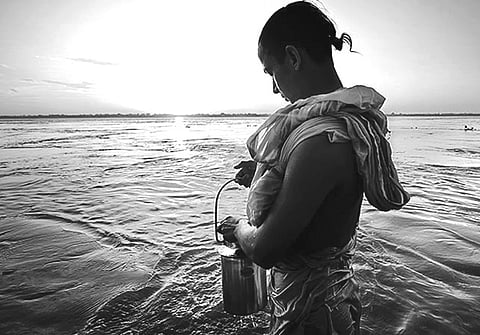

Sanatana Hindu dharma has allocated dates for celebrating numerous festivals through the year. A beautiful aspect of all these festivals is that each of them has a spiritual and a social message.
Every function for instance,is wound around one devatha, a god or a goddess who we recall that day, and offer puja and naivedya, besides special obeisance. For instance, Maha Shivaratri is focused on Shiva, and many of us stay awake chanting his name throughout the night. Likewise, Vaikuntha Ekadasi is the worship of Vishnu, Vinayaka Chaturthi celebrates Ganesha and Janmashtami glorifies Krishna.
But one festival that stands apart on this score is Diwali. It is not designated to the detailed worship of any devatha in particular. On this day, none of us do an elaborate puja, specific to any devatas.
So what is special about Diwali? What distinguishes it from other festivals?
It is the bath, or I should say baths. Of course this is also the festival that lights up the whole place, buying and wearing new clothes, eating delicious spread of sweets and savories, and bursting crackers. But more than all these, it is the bath or snana that is very specific to Diwali.
We ask one another on this day “Ganga snanam aaccha?” (Have you taken bath in the River Ganga?). Snana truly is the distinctive feature of Diwali. Let us look at this custom a little more in detail.
We get up early on the day of Diwaliand take oil-bath in hot or warm water. The hot water is supposed to signify that river Ganga is present in the hot water during the early morning muhurtham, hence, the inquiry about ganga snanam.
But what many, perhaps, don’t know is that tradition prescribes one more snana on Diwali.
A little before 9 am, we are required to take a tula snanam, which is bathing in cold water preferably in a river like Kaveri or from your well if you have one, or under your bathroom tap. We are also told that we should pray to Vishnu during the hot water oil-bath, and to Shiva while taking bath in cold water.
Yes, Diwali is snana-specific and a holy double-bath celebration, if I can call it. Diwali also gives us invaluable social message. Diwali is celebrated to commemorate the vadha or destruction of Narakasura by Krishna. Interestingly, the asura himself is said to have requested Krishna that the day should be replete with good cheer and unalloyed happiness. Narakasura’s mother Bhoodevi endorsed his prayer in which he said “let me suffer for my wrongdoings, but let everyone be happy and prosperous”.
The subtle and graceful message to all of us from the asura, seconded by Bhoodevi and blessed by Krishna, is: “Forget your personal grouses, unhappiness or pique you may have, and rise over any form of ill-feeling caused by your personal misfortunes. Go out and give joy and good cheer to all around you.”
If an Asura could be so enlightened at the time of his death that he prayed for the peace of mankind, though he was being destroyed, civilised mortals like us should certainly do better. I hope we take this message to heart and dispel any gloom we see around us with a smile and a good word to everyone on this day of ‘festival of lights’!
Sarma Sastrigal
(Author, Priest and Commentator)